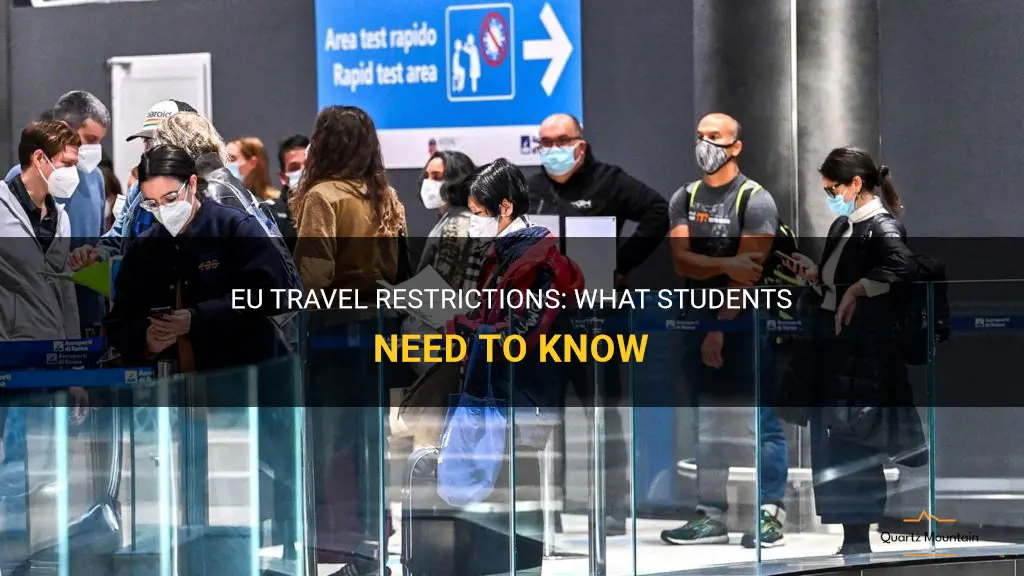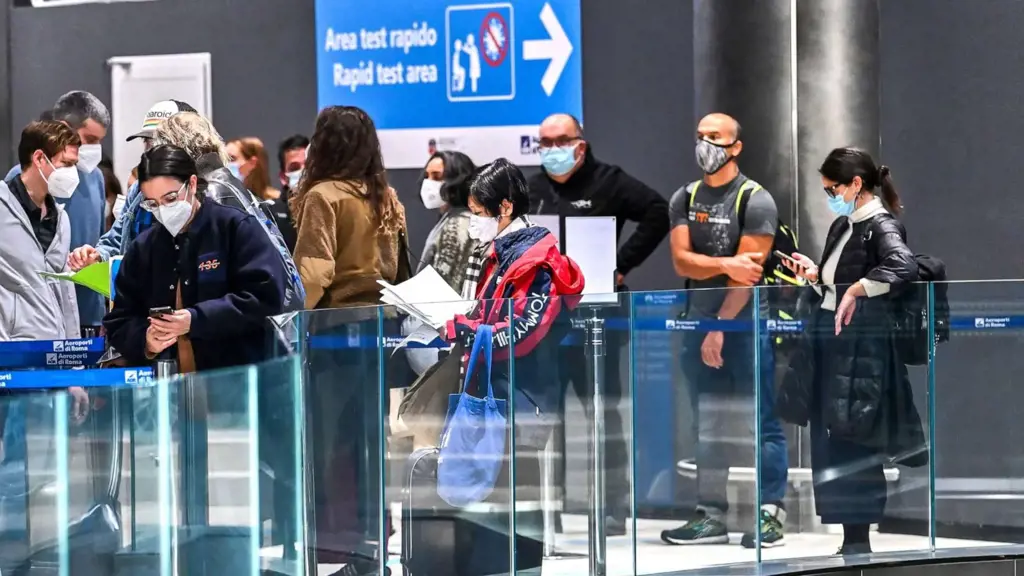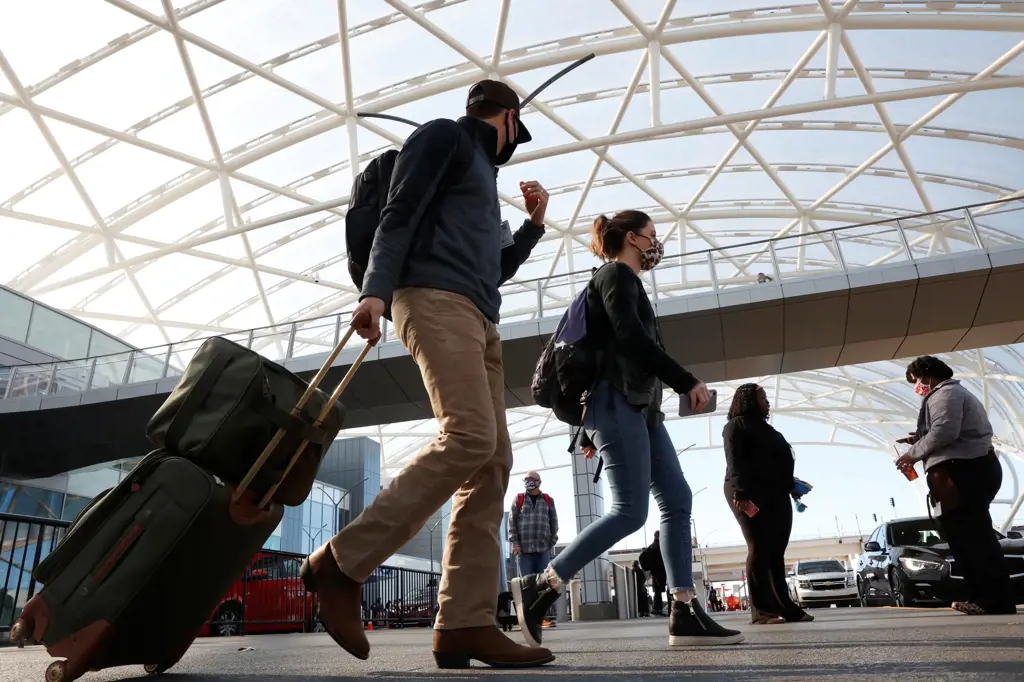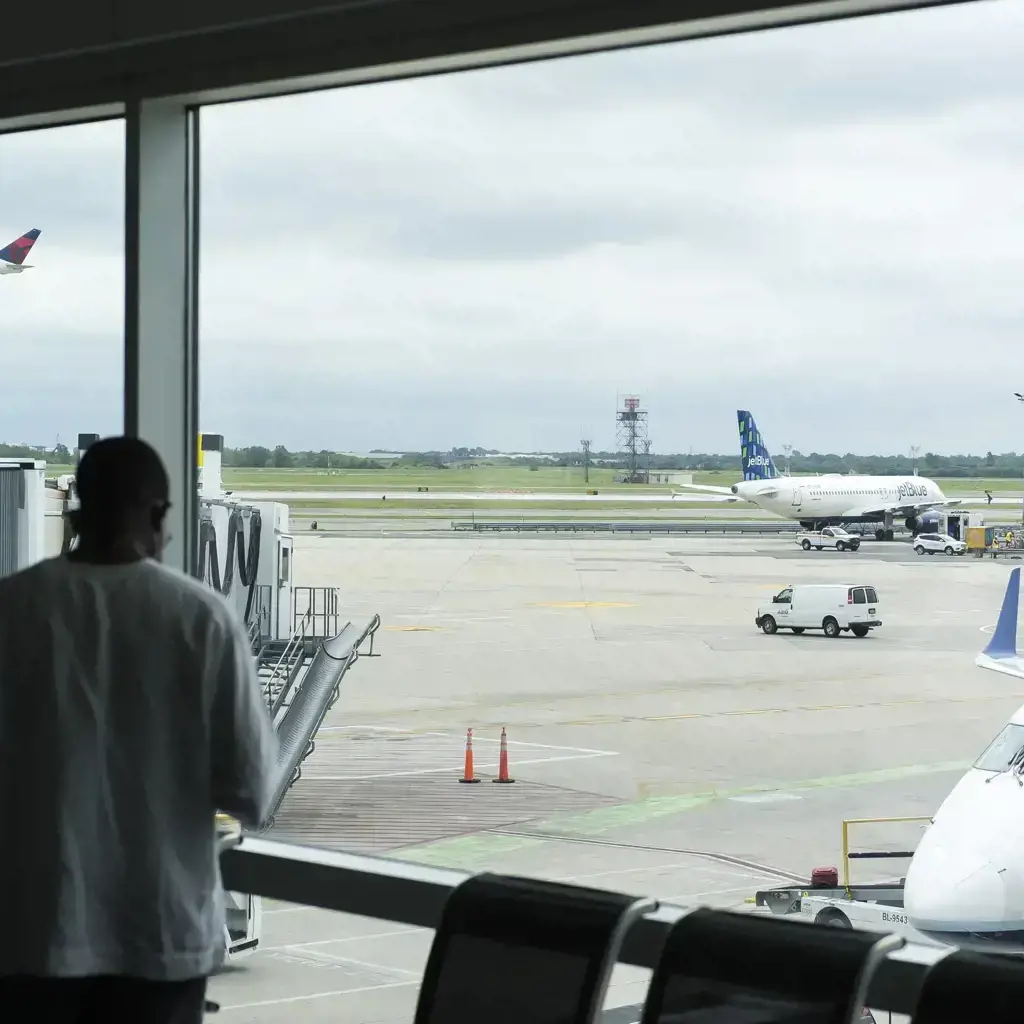
EU travel restrictions for students have become a hot topic recently, as mobility in education has been severely impacted by the ongoing pandemic. Many students from around the world are facing numerous obstacles when it comes to studying abroad within the EU. These restrictions can significantly impact their academic and personal growth, as well as their cultural exchange experiences. As countries implement stricter measures to control the spread of COVID-19, it is crucial to find balance between public health safety and ensuring students can still pursue their educational goals.
What You'll Learn
- What are the current travel restrictions for European students wanting to study abroad?
- Are there any exceptions or allowances for students who need to travel for educational purposes?
- How do these travel restrictions affect students who are already studying abroad in Europe?
- Are there any alternative options for students who are unable to travel to Europe due to the restrictions?
- Are there any plans to ease or lift these travel restrictions in the near future for students?

What are the current travel restrictions for European students wanting to study abroad?

The COVID-19 pandemic has caused a disruption in many aspects of life, including travel. European students who were planning to study abroad are facing various travel restrictions and challenges. Here is an overview of the current travel restrictions for European students wanting to study abroad:
- Border closures and travel bans: Many countries have implemented travel bans and restrictions to prevent the spread of COVID-19. This has led to the closure of borders and limited entry for non-essential travel. Students may find it difficult to travel to their destination country if there are strict travel bans in place.
- Visa and immigration issues: Obtaining a student visa is an essential requirement for studying abroad. However, due to the pandemic, visa processing and immigration services might be delayed or limited. Students may face difficulties in obtaining necessary documentation and visas to travel to their destination country.
- Quarantine requirements: Some countries require travelers to undergo quarantine upon arrival. This means that students may have to isolate themselves for a specified period upon entering the country. Quarantine requirements can have an impact on the timing and planning of study abroad programs.
- Changes in academic schedules: Many universities and educational institutions have revised their academic calendars and moved to online or hybrid learning models. This means that students may have the option to study remotely or postpone their study abroad plans. It is important for students to be aware of the changes in academic schedules and plan accordingly.
- Travel insurance considerations: Travel insurance is essential for any trip, including studying abroad. However, the COVID-19 pandemic has led to changes in insurance policies and coverage. It is important for students to carefully review their insurance policies to ensure they are adequately covered for any potential medical expenses related to COVID-19.
- Fluctuating COVID-19 situation: The situation regarding COVID-19 is constantly changing, with new waves of infections and evolving travel restrictions. Students should stay updated on the latest travel advisories and guidelines issued by their respective governments and educational institutions.
- Financial considerations: Studying abroad can be costly, and the pandemic has added further financial uncertainties. Students should consider the financial implications of their study abroad plans, including potential additional costs for quarantine, travel insurance, and any changes in academic schedules.
- Alternative options: In light of the travel restrictions, some students may consider alternative options such as virtual exchange programs or deferring their study abroad plans. It is important for students to explore alternative options and discuss them with their educational institutions.
In conclusion, European students wanting to study abroad currently face various travel restrictions and challenges due to the COVID-19 pandemic. It is important for students to stay updated on the latest travel advisories, communicate with their educational institutions, and consider alternative options if necessary.
Understanding the Current Travel Restrictions for American Green Card Holders
You may want to see also

Are there any exceptions or allowances for students who need to travel for educational purposes?

In general, students are expected to attend classes and complete assignments in person. However, there are exceptions and allowances for students who need to travel for educational purposes. These exceptions are put in place to ensure that students have the opportunity to engage in unique educational experiences that may not be available in their local area.
One common exception is for students who participate in study abroad programs. These programs allow students to travel to foreign countries and immerse themselves in different cultures and educational environments. Many universities and colleges have agreements with foreign institutions to facilitate these study abroad programs. Students can gain credit towards their degrees while experiencing a different educational system.
Another exception is for students who need to travel to attend conferences, competitions, or other educational events. For example, students who are part of a debate or academic team may need to travel to compete against students from other schools. Similarly, students who are conducting research or presenting their work at a conference may need to travel to attend these events. In these cases, students are typically given permission to miss classes and make up any missed work.
In some cases, students may need to travel due to personal or family emergencies. In these situations, universities and colleges have policies in place to provide support to these students. For example, students who need to travel to be with a sick family member or attend a funeral are generally given the opportunity to make up any missed work without penalty.
It is worth noting that while there are exceptions and allowances for students who need to travel for educational purposes, these exceptions are typically granted on a case-by-case basis. Students are usually required to provide documentation or proof of their need to travel, such as an acceptance letter for a study abroad program or a doctor's note for a family emergency. Additionally, students are generally expected to communicate with their professors and make arrangements to complete any missed work or assignments.
Overall, universities and colleges understand that there are certain situations where students may need to travel for educational purposes. By providing exceptions and allowances, institutions aim to ensure that students have the opportunity to engage in unique educational experiences and support their personal and academic growth.
Navigating China's Outbound Travel Restrictions: What You Need to Know
You may want to see also

How do these travel restrictions affect students who are already studying abroad in Europe?

The outbreak of the coronavirus has led to unprecedented travel restrictions being imposed all around the world, affecting countless individuals and industries. However, one specific group that has been significantly impacted by these restrictions is students who are already studying abroad in Europe.
With the sudden closure of borders and suspension of international flights, many students find themselves trapped in a foreign country, unsure of when they will be able to return to their home countries. This has caused a great deal of anxiety and stress as students worry about their safety, access to healthcare, and being separated from their families during this uncertain time.
One of the main challenges faced by these students is the difficulty in obtaining accurate information about the situation and the steps they need to take. With each country implementing their own measures and constantly changing regulations, it can be overwhelming for students to keep up with the latest updates. Language barriers and cultural differences can further complicate the situation, as it may be harder for students to understand and navigate the local systems.
Another major concern for students studying abroad in Europe is the impact on their academic progress. Many universities have had to suspend in-person classes and transition to online learning. This abrupt shift may present its own set of challenges, as students may not have access to the necessary resources or may face time zone differences that make it difficult to attend virtual classes or participate in group discussions.
Furthermore, students who are dependent on part-time jobs or internships to support themselves may find themselves in a precarious financial situation due to the economic slowdown caused by the pandemic. With the closure of businesses and job losses, these students may struggle to meet their basic needs or pay for accommodation and other essential expenses.
It is essential for universities and governments to provide adequate support and assistance to these students during this challenging period. This can include regular communication and updates, access to healthcare services, provisions for online academic support, and financial resources to help cover essential expenses.
In conclusion, the travel restrictions imposed due to the COVID-19 pandemic have had a significant impact on students who are already studying abroad in Europe. These students face challenges related to their safety, access to healthcare, academic progress, and financial stability. It is crucial for universities and governments to provide necessary support and resources to help these students navigate through these difficult times.
Azerbaijan Implements Travel Restrictions for Indian Citizens Amidst COVID-19 Surge
You may want to see also

Are there any alternative options for students who are unable to travel to Europe due to the restrictions?

Due to the COVID-19 pandemic, traveling restrictions have been imposed worldwide, making it challenging for students to study abroad in Europe. However, there are alternative options available for those unable to travel that can still provide valuable learning experiences.
One option for students unable to travel to Europe is to participate in virtual exchange programs. These programs allow students to connect with international peers, take online courses, and engage in virtual cultural activities. Virtual exchange programs provide opportunities to learn about different cultures and gain intercultural competencies from the comfort of one's home. Through video conferences, online forums, and shared virtual spaces, students can interact with peers from all around the world, exchange ideas, and collaborate on projects.
Another alternative option for students is to explore study abroad programs within their own country. Many universities and colleges offer domestic study abroad programs that provide similar experiences to traditional international programs. Students can still immerse themselves in a new environment, learn from different faculty, and engage with local communities. While it may not offer the same cultural immersion as studying abroad in Europe, domestic study abroad programs can still broaden students' horizons and provide unique academic and personal growth opportunities.
Furthermore, students can consider language immersion programs or language schools located in their own country. These programs often offer intensive language courses and cultural activities that simulate the experience of studying abroad. Students can immerse themselves in the language they are interested in learning, practice their language skills through conversation partners or language exchanges, and participate in cultural events related to the target language. Language immersion programs can be an excellent choice for students who want to improve their language proficiency without traveling abroad.
Lastly, students can explore virtual internships or remote work opportunities that provide a global professional experience. Many organizations are now offering virtual internship programs where students can work on real-world projects and collaborate with teams from different countries. These virtual internships allow students to gain valuable work experience, develop intercultural skills, and build their professional networks. Additionally, students can also consider remote work opportunities that allow them to collaborate with international clients or employers, further enhancing their global perspective and skills.
In conclusion, although travel restrictions may limit students' ability to study abroad in Europe, there are alternative options available that can provide a similar learning experience. Virtual exchange programs, domestic study abroad programs, language immersion programs, and virtual internships or remote work opportunities are all viable alternatives for students who are unable to travel. These options still offer valuable opportunities for personal, academic, and professional growth, even without physically being in Europe.
Understanding Canada's COVID-19 Quarantine Travel Restrictions
You may want to see also

Are there any plans to ease or lift these travel restrictions in the near future for students?

As travel restrictions continue to affect the world amid the ongoing COVID-19 pandemic, many students find themselves questioning whether there will be any plans to ease or lift these restrictions in the near future. The ability to study abroad and experience different cultures has long been a cherished opportunity for students worldwide, but the current circumstances have put these plans on hold for many. Let's explore the possibilities of when these restrictions might be lifted for students eager to embark on their educational journeys.
It is important to note that travel restrictions are implemented and reviewed by individual countries, often based on their assessment of the pandemic situation both domestically and internationally. As such, there is no one-size-fits-all answer to when these restrictions might be eased or lifted for students. However, there are several factors that could contribute to a more favorable situation in the coming months or years.
Vaccination progress plays a crucial role in determining when travel restrictions may be lifted. As more and more people receive vaccinations, the risk of transmission decreases, and countries may feel more comfortable opening their borders to international students. Moreover, some countries have already started making exceptions for vaccinated individuals, allowing them to enter with fewer restrictions. If this trend continues, it could mean promising news for students wanting to travel.
Another factor that could influence the lifting of travel restrictions for students is the development and implementation of effective testing and tracing strategies. Rapid and accurate testing, coupled with efficient contact tracing, can help contain and prevent the spread of the virus. Countries that can effectively track and control outbreaks may be more inclined to welcome students, especially if they can demonstrate a low number of cases among their population.
Furthermore, authorities might take into account the economic benefits of welcoming international students. Many countries rely on revenue generated by their educational institutions to support their economies. With the decline in international students due to travel restrictions, universities and local businesses have suffered financial setbacks. Governments may see the importance of reopening their borders to students as a means to revive their economies while prioritizing safety measures.
Ultimately, decisions regarding the easing or lifting of travel restrictions will depend on how countries navigate their way through the pandemic. As vaccination rates rise, testing strategies improve, and economies strive to recover, there is a likelihood that travel restrictions will gradually be lifted for students. However, it is essential to remain cautious and flexible, as the situation continues to evolve and new variants of the virus emerge.
In the meantime, prospective students can explore alternative options such as online learning or domestic education until international travel becomes more feasible. Universities and educational institutions have made significant efforts to enhance their online programs, ensuring that students can continue their studies remotely. This way, students can still pursue their educational goals while keeping their travel plans on hold.
In conclusion, while it is difficult to predict exactly when travel restrictions will be eased or lifted for students, there are optimistic signs on the horizon. With the progress of vaccination campaigns, improved testing strategies, and economic considerations, countries may see the benefits of welcoming international students sooner rather than later. Until then, it is crucial for students to remain adaptable and explore alternative educational opportunities while they wait for travel restrictions to be lifted.
Latest England Omicron Travel Restrictions: What You Need to Know
You may want to see also
Frequently asked questions
Yes, there are currently travel restrictions for students studying in the EU due to the COVID-19 pandemic. Each EU member state has its own specific rules and regulations, so it is important for students to check with their respective universities and the local authorities for the latest travel updates and requirements. Some countries may require students to provide a negative COVID-19 test result, quarantine upon arrival, or show proof of vaccination.
Yes, international students can enter the EU for study purposes, but they may be subject to certain travel restrictions and requirements. It is important for international students to check the specific entry requirements for the country they plan to study in, such as obtaining a valid student visa, providing proof of enrollment in a recognized educational institution, and fulfilling any mandatory quarantine or testing requirements. It is also advisable for students to regularly check for updates on travel advisories and restrictions.
Whether or not students can travel within the EU during their studies will depend on the travel restrictions and regulations in place at the time. Some countries may have limitations on intercity or interregional travel, while others may allow unrestricted movement within their borders. It is important for students to familiarize themselves with the specific travel rules and regulations of the country they are studying in, as well as any restrictions that may be in place in neighboring countries they wish to visit. It is also advisable for students to stay informed about the latest travel advisories and guidelines from the local authorities.







